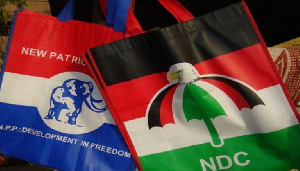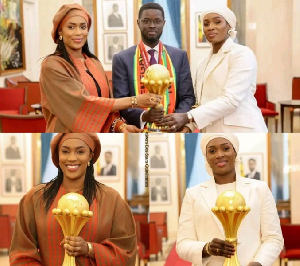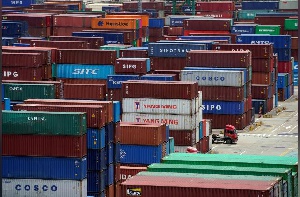(How Useful Is This Wall Street Journal Article?)
I read with dismay some negative, divisive comments generated by the Wall Street Journal Article with that caption attracting this Rejoinder, and appearing on the Ghanaweb.com on July, 2nd 2010. The Article began with a few similar attributes shared by Nigeria and Ghana and sank precipitously into insinuating that some unique fundamental flaws with Nigeria are the reasons why Ghana is doing well at the World Cup and Nigeria did not. But the failure of the Article to mention those shortfalls with Nigeria left a gaping vacuum of malicious innuendos that some folks are sadly filling in with their kind of vicious opinions to create animosity between the two sisterly Nations. This, I find most disturbing and cite as one of the examples of how the Media could manipulate the Public to rile it to instability. It is interesting to observe how the WSJ (Wall Street Journal) seemingly benignly uses a beautiful, enchanting Sport of Soccer with an intrinsic attribute to globally endear people to one another, to sow a seed of discord between Nations. The Article, unfortunately, mistakenly (deliberately or not) leads many people to believe Ghana’s performance at the World Cup symbolizes her superiority to Nigeria in many respects. However, the only comparison that could have made any sense at all if necessary was the management of the Nigeria’s National Soccer Team, the Super Eagles. And even such comparison might have made some sense only for this particular session of the World Cup. And that is because Nigeria advanced admirably higher in some previous sessions of the World Cup than it did in the current session.
Without taking anything away from all those Ghanaians that heeded to our calls to help us do better at the World Cup, we, Ghanaians, should be thankful to providence that we are still surviving at this point in the World Cup. We only happened to pay more attention and prevailed upon our Soccer Authority to give us something to pride ourselves about in these globally stressful times. We had had our own discontent with that Sports Authority for a while, leading to the World Cup. So, we should not be swollen-headed and complacent about this comparison between Nigeria and Ghana by the Wall Street Journal, a News Medium that feels around for the Financial World that it is named after. The Article could be a subtle way of accentuating alerts to the Western Financial Institutions about investing in Nigeria. But worse, it could be construed by many to drive a wedge between Ghana and Nigeria.
We should be careful not to be carried away with the false notion it creates that Ghana is somehow better than Nigeria. There is not a single problem with Nigeria that cannot be found with Ghana, developmentally at least. We should remember that Ghana is only roughly 1/5th the size of Nigeria, and about 1/7th Nigeria's Population. Nigeria also has more Ethnic diversity to manage than Ghana has. So, if we assume Ghana's current problems were multiplied, at least, 5-fold, how do folks think she would be faring, even at the World Cup, following the logic of that Article? More essentially, the size of a Nation does not automatically imbue it with certain particular advantages. And a larger population does not by default translate to higher quality of skills in all areas of Human endeavor.
Notwithstanding the Continental variation, one might want to draw the same comparison between Ghana and the USA, the latter being more than twice larger in size and Population than Nigeria is to Ghana and with a GDP many times greater. And yet the USA suffered a similar fate, directly at the hands of Ghana in the World Cup. How, then, would the Authors of the Article have us evaluate the USA loss to Ghana? Many existing factors, internal and external, collectively determine the outcome of many of the activities within a Nation, and similar factors could have different results when they interact within another Nation. While some results of Human activities are identically uniform among all Nations, they would only show those results under the same precise circumstances.
We should, therefore, not rejoice at the failures of others, even if they were our sworn enemies. Rather, we should empathize with them and have reasons to even count on them for support in our own tribulations and trials. The vicissitudes of time bear much uncertainty for us to take things for granted and rest on our oars. And as we strive to improve on ourselves we should pray and hope that our Neighbors also make significant strides along with us. The influx of refugees into Ghana from Sierra Leone, Liberia and the Cote d’ Ivoire no doubt added to our stress as we by sheer moral requirement opened our doors to these suffering, warring brethren. So, if we wish our Neighbors the worst, we would be compelled to share in their predicament. And that sets us all back in our efforts to improve life for our Citizens. Our destinies are inescapably intertwined and we should not allow foreign elements to muddy the waters to prolong our suffering. Such sentiments are fittingly extended to within Ghana itself to remind us all that our Ethnic differences and even Political distinctions should not blind us to our common destiny that we need to collectively enhance.
Nigeria and all Africa must stand shoulder to shoulder with Ghana. As our Independence led the way for the emancipation of the whole Continent, so could our little successful lead in making inroads into the World's most popular Sports offer all Africa the deserving Global recognition it has long been denied, either by design or circumstances.
I hope our Nigerian brethren would not take the Article the wrong way to dwell on the negatives it connotes, even if it does so accidentally. Ghanaians must also, amidst their jubilation for any victory chalked at the World Cup, wish to have had more of their African brethren come along farther with them. Let's look at it in our Cultural and Traditional sense of seeing a companion off. The longer the companion walks with you to see you off, the more endearing the parting seems to be, and the more lasting tends to be the memory of your encounter with that companion. Let our Nigerian brethren wish Ghana only the best of luck and we would have to share our Glory with them and all Africa if we continue to win.
Long Live Ghana! Long Live Nigeria! Long Live Africa! Long Live Our Common Heritage and mutual benefits from our consanguinity!!
G. K. Berko.
(Realtor, NH. USA).
Opinions of Saturday, 3 July 2010
Columnist: Berko, George














